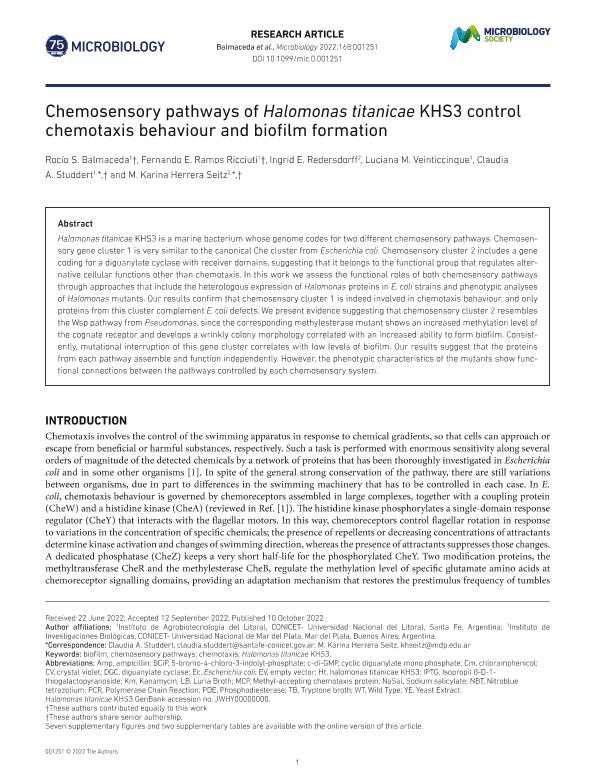Mostrar el registro sencillo del ítem
dc.contributor.author
Balmaceda, Rocio Soledad

dc.contributor.author
Ramos Ricciuti, Fernando Ezequiel

dc.contributor.author
Redersdorff, Ingrid Emelin

dc.contributor.author
Veinticcinque, Luciana

dc.contributor.author
Studdert, Claudia Alicia

dc.contributor.author
Herrera Seitz, Karina

dc.date.available
2023-08-14T10:00:34Z
dc.date.issued
2022-10-10
dc.identifier.citation
Balmaceda, Rocio Soledad; Ramos Ricciuti, Fernando Ezequiel; Redersdorff, Ingrid Emelin; Veinticcinque, Luciana; Studdert, Claudia Alicia; et al.; Chemosensory pathways of Halomonas titanicae KHS3 control chemotaxis behaviour and biofilm formation; Society for General Microbiology; Microbiology-UK; 168; 10; 10-10-2022; 1-15
dc.identifier.issn
1350-0872
dc.identifier.uri
http://hdl.handle.net/11336/208062
dc.description.abstract
Halomonas titanicae KHS3 is a marine bacterium whose genome codes for two different chemosensory pathways. Chemosensory gene cluster 1 is very similar to the canonical Che cluster from Escherichia coli. Chemosensory cluster 2 includes a gene coding for a diguanylate cyclase with receiver domains, suggesting that it belongs to the functional group that regulates alternative cellular functions other than chemotaxis. In this work we assess the functional roles of both chemosensory pathways through approaches that include the heterologous expression of Halomonas proteins in E. coli strains and phenotypic analyses of Halomonas mutants. Our results confirm that chemosensory cluster 1 is indeed involved in chemotaxis behaviour, and only proteins from this cluster complement E. coli defects. We present evidence suggesting that chemosensory cluster 2 resembles the Wsp pathway from Pseudomonas, since the corresponding methylesterase mutant shows an increased methylation level of the cognate receptor and develops a wrinkly colony morphology correlated with an increased ability to form biofilm. Consistently, mutational interruption of this gene cluster correlates with low levels of biofilm. Our results suggest that the proteins from each pathway assemble and function independently. However, the phenotypic characteristics of the mutants show functional connections between the pathways controlled by each chemosensory system.
dc.format
application/pdf
dc.language.iso
eng
dc.publisher
Society for General Microbiology

dc.rights
info:eu-repo/semantics/openAccess
dc.rights.uri
https://creativecommons.org/licenses/by-nc-sa/2.5/ar/
dc.subject
BIOFILM
dc.subject
CHEMOSENSORY PATHWAYS
dc.subject
CHEMOTAXIS
dc.subject
HALOMONAS TITANICAE KHS3
dc.subject.classification
Biología Celular, Microbiología

dc.subject.classification
Ciencias Biológicas

dc.subject.classification
CIENCIAS NATURALES Y EXACTAS

dc.title
Chemosensory pathways of Halomonas titanicae KHS3 control chemotaxis behaviour and biofilm formation
dc.type
info:eu-repo/semantics/article
dc.type
info:ar-repo/semantics/artículo
dc.type
info:eu-repo/semantics/publishedVersion
dc.date.updated
2023-07-06T11:23:19Z
dc.identifier.eissn
1465-2080
dc.journal.volume
168
dc.journal.number
10
dc.journal.pagination
1-15
dc.journal.pais
Reino Unido

dc.description.fil
Fil: Balmaceda, Rocio Soledad. Consejo Nacional de Investigaciones Científicas y Técnicas. Centro Científico Tecnológico Conicet - Santa Fe. Instituto de Agrobiotecnología del Litoral. Universidad Nacional del Litoral. Instituto de Agrobiotecnología del Litoral; Argentina
dc.description.fil
Fil: Ramos Ricciuti, Fernando Ezequiel. Consejo Nacional de Investigaciones Científicas y Técnicas. Centro Científico Tecnológico Conicet - Santa Fe. Instituto de Agrobiotecnología del Litoral. Universidad Nacional del Litoral. Instituto de Agrobiotecnología del Litoral; Argentina
dc.description.fil
Fil: Redersdorff, Ingrid Emelin. Consejo Nacional de Investigaciones Científicas y Técnicas. Centro Científico Tecnológico Conicet - Mar del Plata. Instituto de Investigaciones Biológicas. Universidad Nacional de Mar del Plata. Facultad de Ciencias Exactas y Naturales. Instituto de Investigaciones Biológicas; Argentina
dc.description.fil
Fil: Veinticcinque, Luciana. Consejo Nacional de Investigaciones Científicas y Técnicas. Centro Científico Tecnológico Conicet - Santa Fe. Instituto de Agrobiotecnología del Litoral. Universidad Nacional del Litoral. Instituto de Agrobiotecnología del Litoral; Argentina
dc.description.fil
Fil: Studdert, Claudia Alicia. Consejo Nacional de Investigaciones Científicas y Técnicas. Centro Científico Tecnológico Conicet - Santa Fe. Instituto de Agrobiotecnología del Litoral. Universidad Nacional del Litoral. Instituto de Agrobiotecnología del Litoral; Argentina
dc.description.fil
Fil: Herrera Seitz, Karina. Consejo Nacional de Investigaciones Científicas y Técnicas. Centro Científico Tecnológico Conicet - Mar del Plata. Instituto de Investigaciones Biológicas. Universidad Nacional de Mar del Plata. Facultad de Ciencias Exactas y Naturales. Instituto de Investigaciones Biológicas; Argentina
dc.journal.title
Microbiology-UK

dc.relation.alternativeid
info:eu-repo/semantics/altIdentifier/url/https://www.microbiologyresearch.org/content/journal/micro/10.1099/mic.0.001251
dc.relation.alternativeid
info:eu-repo/semantics/altIdentifier/doi/http://dx.doi.org/10.1099/mic.0.001251
Archivos asociados
